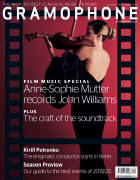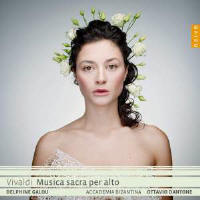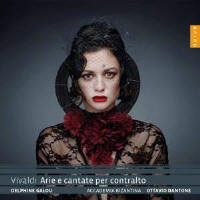Texte paru dans: / Appeared in:
|
|||||||||
|
Outil de traduction (Très approximatif) |
|||||||||
|
Reviewer: Richard Wigmore
The French contralto Delphine Galou has long proved herself a fine Vivaldi
stylist and sings here with her trademark imagination and involvement (blandness
is not in her armoury). In captious mode I’d point to moments where her pure,
rather instrumental timbre develops a flutter under pressure. At times her
rhetorical intensity can compromise evenness of line and tone. But Galou’s
singing always compels with its eloquence of phrase and urgent engagement with
the text. The tenor Alessandro Giangrande makes a lively duet partner in the
hymn Deus tuorum militum – determinedly jolly, despite its text. He is, though,
less convincing slipping between falsetto and his natural tenor voice in the
fragmentary antiphon Regina coeli, written for a Pietà contralto with a
freakishly low range. Dantone’s Accademia Bizantina provide colourful, vividly
gestural accompaniments, and with the brilliant Alessandro Tampieri relish the
fantasy and flamboyance of the D major Violin Concerto with double orchestra. Galou and Accademia Bizantina are likewise in their element in the disc of cantatas and opera arias. Most familiar here is the Arcadian chamber cantata Cessate, omai cessate, long a countertenor favourite but also recorded by a handful of contraltos, including Sara Mingardo (Opus 111, 11/97). If Mingardo sings with more rounded depth of tone, Galou’s no-holds-barred passion and anguish are just as affecting, not least in the terrific final ‘vengeance’ aria. She finds a bright, sopranoish edge for the cheerful O mie porpore più belle, composed to celebrate the new Bishop of Mantua, and brings a virtuoso swagger to the horn-fuelled homage cantata Qual in pioggia dorata, music to massage a princely ego. Although the booklet note is light on dramatic context (depressingly familiar litany), Galou characterises each of the assorted opera arias with flair. My own highlights included the gentle pathos of ‘Andrò fida’ from Tito Manlio, soft-toned recorders cooing in sympathy with the voice, and Damira’s gleefully manipulative ‘Semplice non temer’, tossed off with real comic panache. Minor reservations aside, both discs are worthy of the consistently high standards set by the whole series. Galou fans and Vivaldi collectors alike should need no encouragement. |
|||||||||





